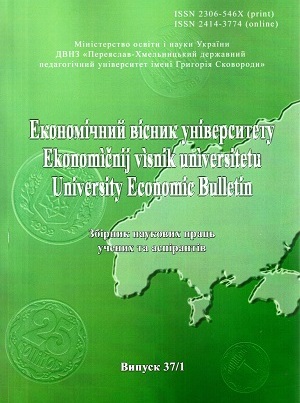INDIVIDUALIZATION OF PROCESSES FOR PREPARATION AND DEVELOPMENT OF WORKERS
INDIVIDUALIZATION OF PROCESSES FOR PREPARATION AND DEVELOPMENT OF WORKERS
Author(s): Serhii Makarenko, Yevheniya Kaplina, Tatyana KazakovaSubject(s): Business Economy / Management, Labor relations, Economic development
Published by: Університет Григорія Сковороди в Переяславі
Keywords: successful specialist; professional career; unemployment; qualitative education; supply and demand; individualization of training processes;
Summary/Abstract: The subject of the study is the process of training and development of workers. The purpose of the study is to determine the peculiarities of the functioning of institutions of higher education and to substantiate the expediency of individualizing the processes of training and development of employees in accordance with modern labor market requirements. The methodological basis of the research consisted of scientific works of domestic and foreign scientists and leading specialists, statistical and analytical materials of state authorities. In the process of research, mathematical, analytical and abstract-logical methods were used. Research results. It has been established that for full use of labor potential managers and managers of business entities of all forms of ownership should receive not only diplomas for higher education, academic degree, etc., but also qualitative knowledge on strategic management of the enterprise and personnel, in particular, organization and business planning, risk management, logistics, innovation and investment management, etc. It has been proved that in today's business environment, public authorities and local self-government bodies, together with representatives of business entities of all forms of ownership, are interested in developing a co-ordinated mechanism for training specialists for relevant curricula that will not only reduce the unemployment rate among the economically active population, but and create an effective model of development and improve the overall quality of life. The essential shortage of qualified specialists in domestic subjects of management of all forms of ownership was revealed, which is also confirmed by calculations of the coefficient of elasticity and revealed by a faster growth rate of gross domestic product in comparison with the growth rates of the economically active population aged 15-70. The feasibility of introducing individual trajectories of practical training of future specialists as additional justification and stimulation of higher education among potential applicants is substantiated. The field of application of results. The results of the study can be used by all stakeholders, including public authorities and local self-government, higher education institutions and leading enterprises in the region. Conclusions. Implementation of the measures developed will reduce the costs that the entity may incur when training young professionals directly at the workplace (in the form of additional salary for mentoring teachers), the duration of the adaptation period and will contribute to the achievement of a high level of productivity at the earliest possible time.
Journal: Економічний вісник університету
- Issue Year: 1/2018
- Issue No: 37
- Page Range: 117-125
- Page Count: 9
- Language: English

